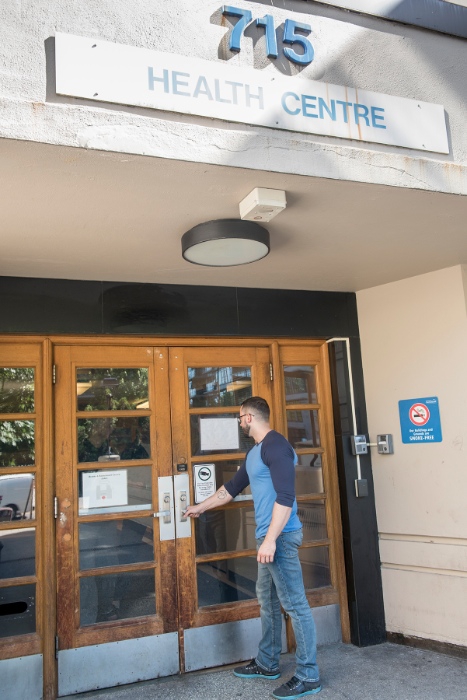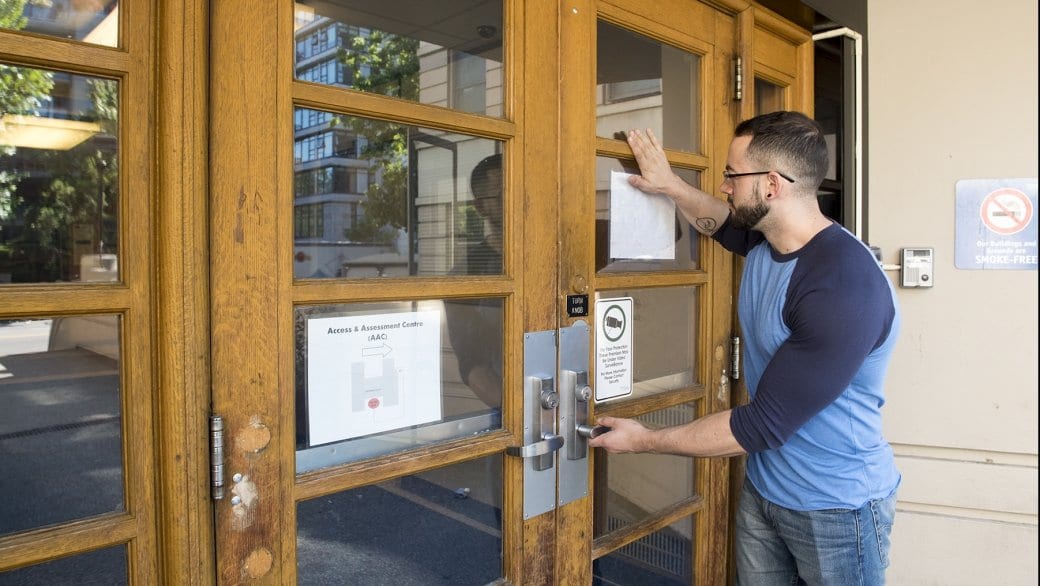“You ever think about having a girlfriend?”
No, I think about having a boyfriend.
“Oh, you mean friendships with men.”
No, I mean romantically.
“Oh . . . you mean . . . What do you mean?”
I wait.
“You mean romantically? What are you. . . you’re gay?”
It’s typical in a psychiatry intake session for a doctor to ask about relationships, for obvious reasons.
Loneliness and isolation are major factors contributing to depression and anxiety. Usually, sufferers are seeking to improve their relationships, among other things.
But the question has never been asked of me loaded with any presumption of my sexuality before.
I’ve seen two doctors and three counsellors since being diagnosed with depression and anxiety in June 2015. They’ve all used gender-neutral terms, and I’ve elaborated that I have sexual relationships with men if it felt germane.
It’s a basic level of sensitivity I’m shocked to find this doctor — conducting my intake session at Vancouver Coastal Health’s (VCH) public outpatient psychiatry service on West 12th Avenue — does not possess.
I consider just letting it go, not correcting him.
Queer people often heave an inward sigh when the hetero-neutral status quo is reinforced in our faces, then carry on if the interaction is a minor, passing one. It’s not right, but it’s a necessity of surviving unmolested. Coming out all the time is exhausting.
But I’ve come to the health centre after a six-month wait list, seeking a safe and understanding environment to reveal and work through my psychological trauma. I’m not about to dig myself in deeper with lies, nor should I feel pressured to do so by a public health provider.
His question may be marginalizing, may remind me that the world is hetero-neutral and I am therefore deviant and abnormal — but maybe it was a mere thoughtless mistake.
I expect him to say “Oh! My mistake, that was presumptuous,” and carry on.
Instead, he seems confused. Like he’s looking to me to help him find the answer.
I’m not sure how I can make it much clearer.

(Derek Bedry tries the door at Vancouver Coastal Health’s outpatient psychiatry service, located at 715 W 12th Ave./Tallulah/Daily Xtra)
I’m suddenly reluctant to give him the chance to conveniently categorize and dismiss me. I fear he will reduce my trauma, my reason for being there, to my queerness. Still, I reply.
I tell him I’m gay.
“Oh,” he reels, physically, recoiling in his chair and then turning to his computer desk, fussing with papers. “Well, I don’t have any . . . it’s a personal choice,” he waves his hand.
Great. I’m thinking this is the worst-case scenario for me. I have a service provider who lacks even a fundamental sensitivity to, let alone understanding of, sexual identity.
I can’t be the first gay guy he’s ever seen, can I?
“It’s actually not a choice,” I say.
And it gets worse.
“Not a choice,” he repeats back to me. “So you’ve been like this for a while, eh?”
He is smirking. Maybe masking discomfort at having his unpreparedness caught out — if I’m to be charitable.
I try a plastic smile. “Yes. People are, you know.”
It’s weak but I’m in fight-or-flight mode. I just want this to be over.
He moves on, says he’ll refer me to VCH’s group counselling sessions. I thank him for his time.
As I leave the room, my head is swimming with dread about the next stage of my mental health recovery. If I join this group counselling, am I going to feel marginalized?
If the intake psychiatrist managed to get here without ever encountering a queer person before, let alone getting trained, how ill-equipped will the group facilitators be?
I approach the reception desk. I beat around the bush, asking the receptionist for details about the next steps, who will facilitate it, who will I communicate with when I’m able to get into group sessions from the wait list (another three months).
Finally, I say, “Actually, my main concern is that I never want to have to deal with that doctor again.”
The receptionist doesn’t ask any questions about why, but says he can leave a note on my file about it. If I want to discuss anything further, there are higher-ups who can handle that. He doesn’t give me their contact information.

(If doctors lack sensitivity training, how many more LGBT people will slip through the cracks of health care, Derek Bedry wonders./Tallulah/Daily Xtra)
I thank him and walk out of the health centre. I walk half a block. I stop and pull out my phone. I call back. I’m not sure which receptionist has answered. It sounds like it might be someone else, not the guy I just spoke to inside.
I tell them I just met with an intake doctor and ask them to close my file. “I don’t feel safe,” I tell the receptionist.
“Okay, we can do that, but if you ever want to get back in, you’ll have to be re-referred and go back on the waiting list,” he replies.
I say that’s fine. The receptionist says okay and closes my file. No questions asked.
A few hours later, I posted the play-by-play on Facebook. I was prepared to leave it at that. I felt in shock. I didn’t feel empowered to file a complaint with the institution if this doctor was a representative of this important facet of its services.
I didn’t seriously consider filing a complaint until my Facebook friends encouraged me to act and told me this absolutely wouldn’t be deemed acceptable.
So I called VCH.
A supervisor apologized to me, seemed concerned about the treatment I’d received, emphasized that outpatient psychiatry and VCH try to be as engaging as possible and do work successfully with people of many different backgrounds, including LGBT people, and promised a medical director would follow up.
In light of Orlando, this might look like small potatoes. Even invoking Orlando to say it’s not the same almost creates an equivalency I would rather avoid. But the Orlando shooting underscores why queer people need safe spaces.
The fact is, queer people everywhere need safety from a world that, despite our progress, despite how comfortable we may feel in our progressive cities, occasionally reminds us we aren’t welcome everywhere.
It could happen to anyone.
Within a few days, the supervisor I’d spoken to had approved a rescheduled appointment for me with a new doctor.
As of publication, I am still looking forward to that meeting. I trust it will be better, and I hope my experience will prompt VCH to implement a process for ensuring intake psychiatrists have the proper training.

 Why you can trust Xtra
Why you can trust Xtra


